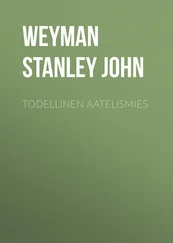Stanley Weyman - My Lady Rotha - A Romance
Здесь есть возможность читать онлайн «Stanley Weyman - My Lady Rotha - A Romance» — ознакомительный отрывок электронной книги совершенно бесплатно, а после прочтения отрывка купить полную версию. В некоторых случаях можно слушать аудио, скачать через торрент в формате fb2 и присутствует краткое содержание. Жанр: foreign_prose, на английском языке. Описание произведения, (предисловие) а так же отзывы посетителей доступны на портале библиотеки ЛибКат.
- Название:My Lady Rotha: A Romance
- Автор:
- Жанр:
- Год:неизвестен
- ISBN:нет данных
- Рейтинг книги:3 / 5. Голосов: 1
-
Избранное:Добавить в избранное
- Отзывы:
-
Ваша оценка:
- 60
- 1
- 2
- 3
- 4
- 5
My Lady Rotha: A Romance: краткое содержание, описание и аннотация
Предлагаем к чтению аннотацию, описание, краткое содержание или предисловие (зависит от того, что написал сам автор книги «My Lady Rotha: A Romance»). Если вы не нашли необходимую информацию о книге — напишите в комментариях, мы постараемся отыскать её.
My Lady Rotha: A Romance — читать онлайн ознакомительный отрывок
Ниже представлен текст книги, разбитый по страницам. Система сохранения места последней прочитанной страницы, позволяет с удобством читать онлайн бесплатно книгу «My Lady Rotha: A Romance», без необходимости каждый раз заново искать на чём Вы остановились. Поставьте закладку, и сможете в любой момент перейти на страницу, на которой закончили чтение.
Интервал:
Закладка:
And this was right. Nor for a time did I see anything wrong or any sign of mischief brewing; though tongues in the town wagged more freely, as the cloud of war rolled ever southward and away from us. But six months later the news of Count Tilly's death reached us. Then, or it might be a fortnight afterwards-so long I think respect for my lady's loss and the new hatchment restrained the good-for-naughts-the trouble began. How it arose, and what shape it took, and how I came athwart it, I am going to tell you without further preface.
It was about the third Monday in May of that year, 1632. A broken lock in one of the rooms at the castle had baffled the skill of our smith, and about nightfall, thinking to take a cup of beer at the Red Hart on my way back, I went down to Peter the locksmith's in the town. His forge stands in the winding lane, which joins the High Street at the Red Hart, after running half round the town inside the wall; so that one errand was a fair excuse for the other. When I had given him his order and come out again, I found that what with the darkness of the lane and the blaze of his fire which had got into my eyes, I could not see a yard before me. A little fine rain was falling with a chilly east wind, and the town seemed dead. The pavement felt greasy under foot, and gave out a rank smell. However, I thought of the cheery kitchen at the Red Hart and stumbled along as fast as I could, until turning a corner I came in sight of the lanthorn which hangs over the entrance to the lane.
I saw it, but short of it, something took and held my eye: a warm stream of light, which shone across the path, and fell brightly on the rough surface of the town-wall. It came from a small window on my left. I had to pass close beside this window, and out of curiosity I looked in. What I saw was so surprising that I stopped to look again.
The room inside was low and small and bare, with an earthen floor and no fireplace. On a ragged pallet in one corner lay an elderly man, to whose wasted face and pallid cheeks a long white moustache, which strayed over the coverlet, gave an air of incongruous fierceness. His bright eyes were fixed on the door as if he listened. A child, three or four years old, sat on the floor beside him, playing with a yellow cat.
It was neither of these figures, however, which held my gaze, but that of a young girl who knelt on the floor near the head of the bed. A little crucifix stood propped against the wall before her, and she had a string of beads in her hands. Her face was turned from me, but I felt that her lips moved. I had never seen a Romanist at prayer before, and I lingered a moment, thinking in the first place that she would have done better had she swung the shutter against the window; and in the next, that with her dark hair hanging about her neck and her head bent devoutly, she looked so weak and fragile that the stoutest Protestant could not have found it in his heart to harm her.
Suddenly a noise, which dully reached me where I stood outside the casement, caused her to start in alarm, and turn her head. At the same moment the cat sprang away affrighted, and the man on the bed stirred and tried to rise. This breaking the spell, I stole quietly away and went round the corner to the door of the inn.
Though I had never considered the girl closely before, I knew who she was. Some eight months earlier, while Tilly, hard pressed by the King of Sweden, still stood at bay, keeping down Saxony with one hand, and Hesse with the other, the man on the pallet, Stephen Wort, a sergeant of jagers, had been wounded in a skirmish beyond the river. Why Tilly, who was used to seeing men die round him like flies in winter, gave a second thought to this man more than to others, I cannot say. But for some reason, when he visited us before Breitenfeld, he brought the wounded sergeant in his train, and when he went left him at the inn. Some said that the man had saved his life, others that the two were born on the same day and shared the same horoscope. More probably Tilly knew nothing of the man, and the captain of the escort was the active party. I imagine he had a kindness for Wort, and knowing that outside our little valley a wounded man of Tilly's army would find as short shrift as a hamstrung wolf, took occasion to leave him with us.
I thought of all this as I stood fumbling about the door for the great bell. The times were such that even inns shut their doors at night, and I had to wait and blow on my fingers-for no wind is colder than a May wind-until I was admitted. Inside, however, the blazing fire and cheerful kitchen with its show of gleaming pewter, and its great polished settles winking solemnly in the heat, made amends for all. I forgot the wounded man and his daughter and the fog outside. There were eight or nine men present, among them Hofman, who was then Burgomaster, Dietz, the town minister, and Klink our host.
They were people I met every day, and sometimes more than once a day, and they greeted me with a silent nod. The lad who waited brought me a cup of beer, and I said that the night was cold for the time of year. Some one assented, but the company in general sat silent, sagely sucking their lips, or exchanging glances which seemed to indicate a secret understanding.
I was not slow to see that this had to do with me and that my entrance had cut short some jest or story. I waited patiently to learn what it was, and presently I was enlightened. After a few minutes Klink the host rose from his seat. First looking from one to another of his neighbours, as if to assure himself of their sympathy, he stole quietly across the kitchen to a door which stood in one corner. Here he paused a moment listening, and then on a sudden struck the door a couple of blows, which made the pewters ring again.
'Hi! Within there!' he cried in his great voice. Are you packing? Are you packing, wench? Because out you go to-morrow, pack or no pack! Out you go, do you hear?'
He stood a moment waiting for an answer, but seemed to get none; on which he came back to his seat, and chuckling fatly to himself, looked round on his neighbours for applause. One winked and another rubbed his calves. The greater number eyed the fire with a sly smile. For my part I was slow of apprehension. I did not understand but waited to hear more.
For five minutes we all sat silent, sucking our lips. Then Klink rose again with a knowing look, and crossed the kitchen on tiptoe with the same parade of caution as before. Bang!' He struck the door until it rattled on its hinges.
'Hi! You there!' he thundered. 'Do you hear, you jade? Are you packing? Are you packing, I say? Because pack or no pack, to-morrow you go! I am a man of my word.'
He did not wait this time for an answer, but came back to us with a self-satisfied grin on his face. He drank some beer-he was a big ponderous man with a red face and small pig's eyes-and pointed over his shoulders with the cup. 'Eh?' he said, raising his eye-brows.
'Good!' a man growled who sat opposite to him.
'Quite right!' said a second in the same tone. 'Popish baggage!'
Hofman said nothing, but nodded, with a sly glance at me. Dietz the Minister nodded curtly also, and looked hard at the fire. The rest laughed.
For my part I felt very little like laughing. When I considered that this clumsy jest was being played at the expense of the poor girl, whom I had seen at her prayers, and that likely enough it was being played for the tenth time-when I reflected that these heavy fellows were sitting at their ease by this great fire watching the logs blaze and the ruddy light flicker up the chimney, while she sat in cold and discomfort, fearing every sound and trembling at every whisper, I could have found it in my heart to get up and say what I thought of it. And my speech would have astonished them. But I remembered, in time, that least said is soonest mended, and that after all words break no bones, and I did no more than sniff and shrug my shoulders.
Читать дальшеИнтервал:
Закладка:
Похожие книги на «My Lady Rotha: A Romance»
Представляем Вашему вниманию похожие книги на «My Lady Rotha: A Romance» списком для выбора. Мы отобрали схожую по названию и смыслу литературу в надежде предоставить читателям больше вариантов отыскать новые, интересные, ещё непрочитанные произведения.
Обсуждение, отзывы о книге «My Lady Rotha: A Romance» и просто собственные мнения читателей. Оставьте ваши комментарии, напишите, что Вы думаете о произведении, его смысле или главных героях. Укажите что конкретно понравилось, а что нет, и почему Вы так считаете.












